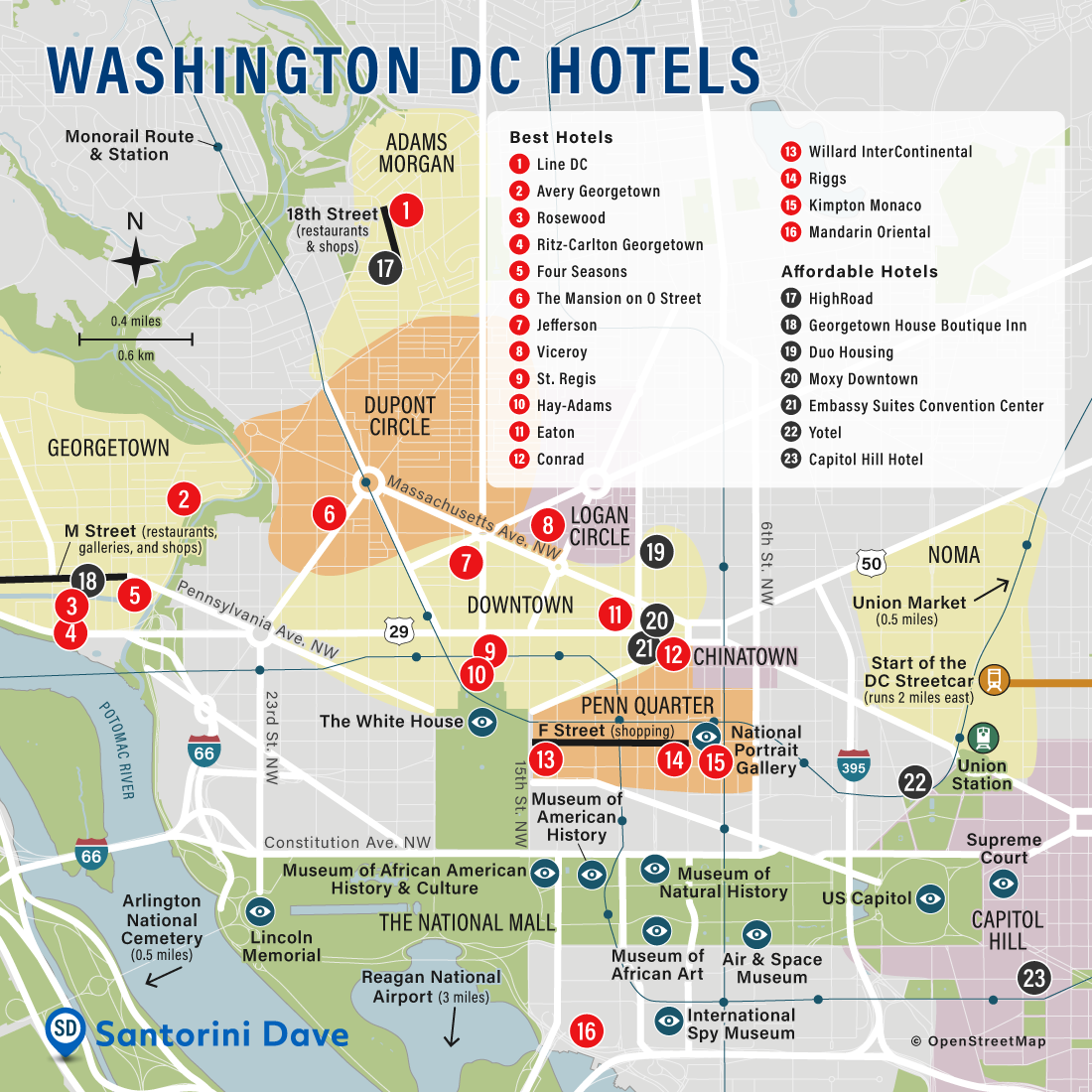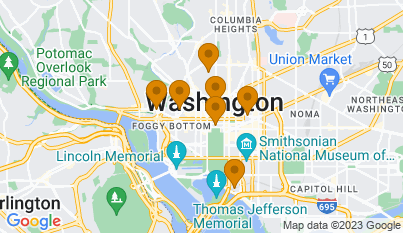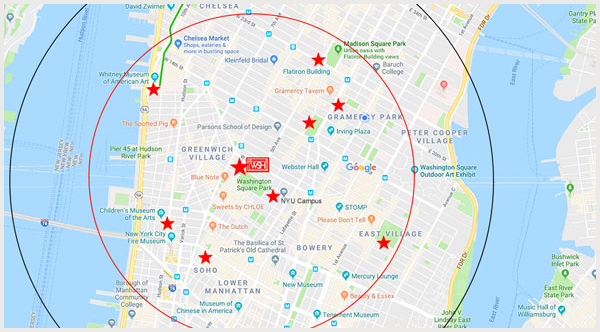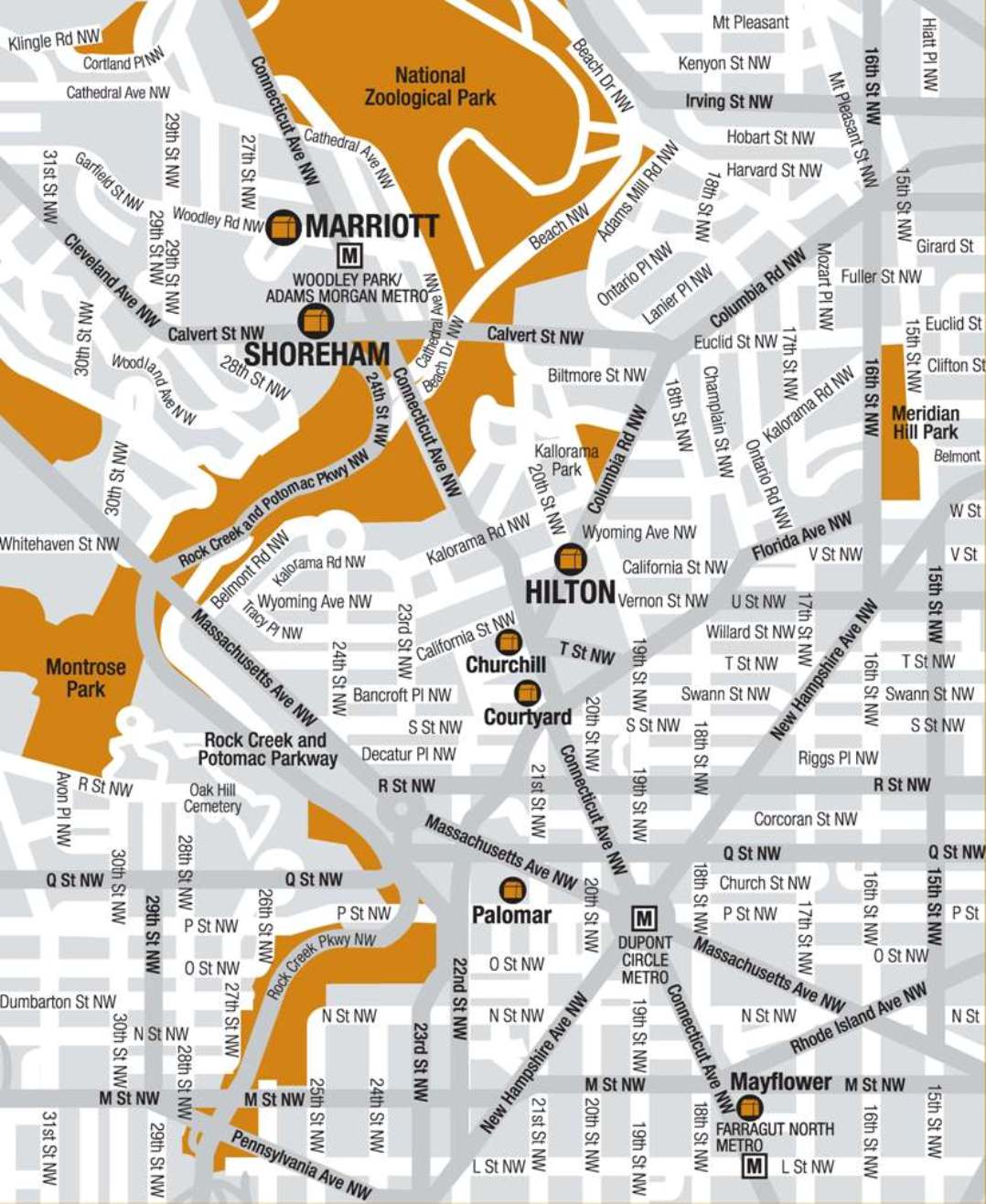hotels in washington dc map
Related Articles: hotels in washington dc map
Introduction
In this auspicious occasion, we are delighted to delve into the intriguing topic related to hotels in washington dc map. Let’s weave interesting information and offer fresh perspectives to the readers.
Table of Content
Navigating Washington, D.C.: A Guide to Hotels and Their Locations

Washington, D.C., the nation’s capital, is a vibrant city brimming with history, culture, and attractions. Whether you’re a history buff, an art enthusiast, or a political observer, the city offers a wealth of experiences. Choosing the right hotel location is crucial for maximizing your visit, as it directly impacts your ability to explore the city’s diverse offerings.
This guide delves into the various hotel districts in Washington, D.C., providing a comprehensive overview of their unique characteristics and the attractions they offer. By understanding the layout of the city and the advantages of each hotel zone, travelers can select accommodations that align perfectly with their interests and travel style.
Hotel Districts in Washington, D.C.
1. Downtown/Penn Quarter: This bustling area is home to the National Mall, Smithsonian museums, and the White House. It’s an ideal choice for those seeking proximity to iconic landmarks and cultural institutions.
- Key Attractions: National Mall, Smithsonian museums, White House, National Gallery of Art, International Spy Museum, Ford’s Theatre
- Hotel Types: Luxury hotels, boutique hotels, mid-range hotels
- Advantages: Walking distance to major attractions, vibrant nightlife, diverse dining options
- Disadvantages: Can be crowded, higher prices, limited parking
2. Capitol Hill: Located just east of the National Mall, Capitol Hill is the heart of American politics. It’s a historic neighborhood with charming row houses and a relaxed atmosphere.
- Key Attractions: United States Capitol Building, Library of Congress, Supreme Court, Eastern Market, Folger Shakespeare Library
- Hotel Types: Boutique hotels, historic hotels, bed and breakfasts
- Advantages: Quiet and residential atmosphere, proximity to political landmarks, unique historical character
- Disadvantages: Limited dining options compared to downtown, less nightlife, can be less convenient for exploring other areas
3. Georgetown: A charming historic district with cobblestone streets, boutiques, and upscale restaurants, Georgetown is perfect for those seeking a luxurious and sophisticated experience.
- Key Attractions: Georgetown University, Georgetown Waterfront Park, C&O Canal, Old Stone House, Dumbarton Oaks Research Library and Collection
- Hotel Types: Luxury hotels, boutique hotels, historic hotels
- Advantages: Upscale shopping and dining, picturesque setting, easy access to the Potomac River
- Disadvantages: Can be expensive, limited public transportation, less central location
4. Adams Morgan: A diverse and vibrant neighborhood known for its eclectic mix of shops, restaurants, and nightlife, Adams Morgan offers a unique cultural experience.
- Key Attractions: Adams Morgan Park, Meridian Hill Park, The Mansion on O Street, Kalorama, Embassy Row
- Hotel Types: Boutique hotels, budget-friendly hotels, hostels
- Advantages: Lively nightlife, diverse dining options, cultural immersion, proximity to the National Zoo
- Disadvantages: Can be noisy at night, limited parking, not as centrally located
5. Dupont Circle: An elegant neighborhood with a rich history, Dupont Circle offers a blend of cultural attractions, sophisticated dining, and vibrant nightlife.
- Key Attractions: Dupont Circle, Phillips Collection, Washington National Cathedral, The National Geographic Museum, The Shakespeare Theatre Company
- Hotel Types: Luxury hotels, boutique hotels, mid-range hotels
- Advantages: Central location, easy access to public transportation, diverse dining options, vibrant nightlife
- Disadvantages: Can be expensive, limited parking, less family-friendly
6. Foggy Bottom: Situated near the State Department and the Kennedy Center, Foggy Bottom is a convenient location for those interested in politics and performing arts.
- Key Attractions: Kennedy Center, Watergate Complex, State Department, The World Bank, The International Monetary Fund
- Hotel Types: Luxury hotels, mid-range hotels, budget-friendly hotels
- Advantages: Proximity to the Kennedy Center, easy access to public transportation, central location
- Disadvantages: Limited dining options, less nightlife, not as charming as other neighborhoods
7. National Harbor: Located on the Potomac River, National Harbor is a waterfront destination with shops, restaurants, and entertainment options. It’s a great option for families and those seeking a relaxed atmosphere.
- Key Attractions: Gaylord National Resort & Convention Center, Capital Wheel, National Harbor Waterfront, Tanger Outlets, MGM National Harbor
- Hotel Types: Resort hotels, luxury hotels, mid-range hotels
- Advantages: Waterfront location, entertainment options, family-friendly, easy access to the city
- Disadvantages: Can be crowded, limited public transportation, less central location
8. Bethesda: A suburban area just outside of Washington, D.C., Bethesda offers a more relaxed atmosphere with a blend of residential areas and commercial districts.
- Key Attractions: Bethesda Row, Bethesda Trolley Trail, National Institutes of Health, Walter Reed National Military Medical Center
- Hotel Types: Luxury hotels, mid-range hotels, budget-friendly hotels
- Advantages: Quiet and peaceful atmosphere, easy access to the city, diverse dining options
- Disadvantages: Less central location, limited public transportation, less nightlife
9. Alexandria: A historic waterfront city just across the Potomac River, Alexandria offers a charming atmosphere with cobblestone streets, historic buildings, and a vibrant waterfront.
- Key Attractions: Old Town Alexandria, Alexandria Waterfront Park, Torpedo Factory Art Center, George Washington’s Mount Vernon
- Hotel Types: Boutique hotels, historic hotels, bed and breakfasts
- Advantages: Picturesque setting, historic charm, diverse dining options, easy access to the city
- Disadvantages: Less central location, limited public transportation, less nightlife
FAQs about Hotels in Washington, D.C.
1. What is the best time of year to visit Washington, D.C.?
The best time to visit Washington, D.C., is during the spring (April-May) or fall (September-October) when the weather is pleasant and the crowds are smaller.
2. How much does it cost to stay in a hotel in Washington, D.C.?
Hotel prices in Washington, D.C., vary widely depending on the location, time of year, and type of hotel. Expect to pay anywhere from $100 to $500 per night for a standard hotel room.
3. What are the best neighborhoods for budget-friendly hotels?
Adams Morgan, Foggy Bottom, and Bethesda offer budget-friendly hotel options.
4. What are the best neighborhoods for luxury hotels?
Downtown/Penn Quarter, Georgetown, and Dupont Circle are known for their luxurious hotels.
5. What are the best neighborhoods for families?
National Harbor, Bethesda, and Alexandria offer family-friendly hotels and attractions.
Tips for Choosing a Hotel in Washington, D.C.
- Consider your budget: Hotel prices in Washington, D.C., can vary widely. Determine your budget before you start searching.
- Identify your priorities: Think about the attractions you want to see, the type of atmosphere you prefer, and your transportation needs.
- Read reviews: Check online reviews to get an idea of the hotel’s amenities, service, and overall experience.
- Book in advance: Hotel rooms in Washington, D.C., can book up quickly, especially during peak season. Book in advance to secure the best rates and availability.
- Consider the location: Choose a hotel that is convenient to the attractions you want to see and the transportation options you prefer.
- Look for amenities: Decide which amenities are important to you, such as a pool, fitness center, or free breakfast.
- Check the parking situation: Parking can be expensive and difficult to find in Washington, D.C. Check if the hotel offers parking or if there are nearby parking garages.
Conclusion
Choosing the right hotel location is key to maximizing your experience in Washington, D.C. By understanding the unique characteristics of each neighborhood and considering your personal preferences, you can select accommodations that perfectly align with your travel goals. Whether you’re seeking proximity to iconic landmarks, a quiet and historic atmosphere, or a vibrant and eclectic experience, Washington, D.C., offers a diverse range of hotels to suit every traveler’s needs.

![]()





Closure
Thus, we hope this article has provided valuable insights into hotels in washington dc map. We thank you for taking the time to read this article. See you in our next article!